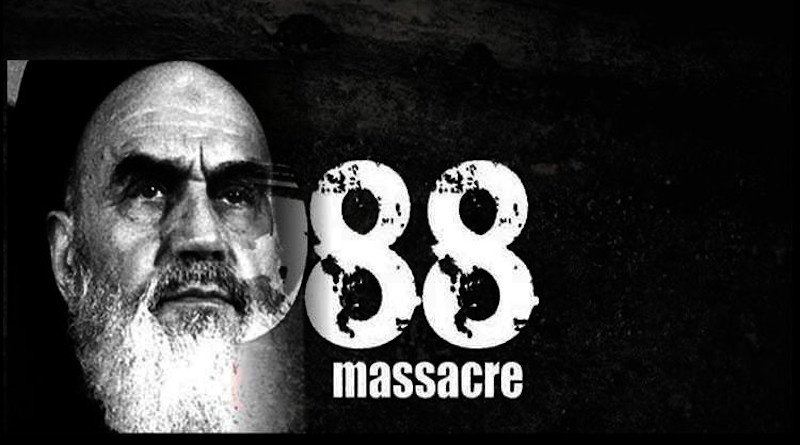32 Years On, Investigation Into Iran’s 1988 Massacre Is Well Overdue – OpEd
By Amir Seifi*
A group of UN human rights experts warned the Iranian regime that their prison massacres in 1988 could amount to crimes against humanity.
They sent a letter to Iran dated 3 September 2020 which was made public on the eve of International Human Rights Day, December 10, after the Iranian authorities failed to respond.
“A turning point in the long-standing struggles of victims’ families and survivors,” wrote Amnesty International in its statement welcoming the push to hold the perpetrators of the 1988 massacre accountable.
For three decades, the survivors, relatives, and the family of the victims have been on a quest for the truth regarding their loved ones.
In the summer of 1988, based on a fatwa by the founder of the Islamic Republic and then Supreme Leader Ayatollah Ruhollah Khomeini, more than 30,000 political prisoners were massacred.
Khomeini’s order called for the execution of all political prisoners affiliated to the main opposition group the People’s Mojahedin Organisation of Iran (PMOI/MEK) who remained loyal to the organisation.
Khomeini wrote: “It is decreed that those who are in prison throughout the country and remain steadfast in their support for the [MEK] are waging war on God and are condemned to execution.”
Even prisoners, many of whom had finished their sentences or had been arrested for simple “crimes” such as distributing opposition newspapers, were tried in minutes-long trials and executed.
The massacre was carried out by three-member commissions known as ‘Death Commissions’, formed across Iran to send the political prisoners, who refused to abandon their beliefs, to their death.
Since 2016, the names of nearly 100 Death Commission members have been revealed. Many still hold senior positions in the Iranian judiciary or government. They include the current Justice Minister Alireza Avaei, the head of the Judiciary Ebrahim Raisi, and advisor to the Judiciary Chief Mostafa Pour-Mohammadi.
According to the Iranian theocracy’s laws, religious edicts from the Supreme Leader cannot be reversed by anyone but himself, and Khomeini’s fatwa is still valid. Many MEK members were executed in later years, based on this order.
The worst crime against humanity since World War II
Taher Boumedra, a former chief of the Human Rights Office of the United Nations Assistance Mission for Iraq (UNAMI) and a legal expert, underlined in an article in Townhall that even though the crime itself was perpetrated 32 years ago, it is still prosecutable today and enlightened that the Iranian officials brazenly claim Khomeini’s fatwa still stands against the MEK dissidents who seek to topple the regime.
British human rights lawyer and ex-UN judge Geoffrey Robertson who was tasked with investigating the 1988 massacre described it “as the worst crime against humanity since World War II”.
In their letter to the Iranian authorities, the UN experts underlined “the systematic concealment of the fate and whereabouts of the victims amounts to an ongoing crime against humanity of enforced disappearance.”
The UN experts stated that if the Iranian government “continues to refuse to uphold its obligations under international human rights law,” they “will call on the international community to take action to investigate the cases including through the establishment of an international investigation.”
But this is not new. The authorities persist in their disavowal of the truth. In a reply submitted in October 1990 concerning 3,620 cases of executions mentioned in the reports of the UN Special Representative between January 1988 to February 1990, the Iranian authorities did not even acknowledge one single execution being carried out in 1988. They claimed that “the names of 2,109 persons allegedly executed cannot be recognised.”
In a subsequent reply in January 1991, which concerned the fate and whereabouts of an additional 346 individuals, including 47 who were recorded as executed in 1988, the Iranian authorities again refused to acknowledge any of the 1988 executions.
But how can a murderer investigate their own crimes? The failure of the Iranian authorities to give a clear response throughout the years demonstrates that the regime is neither willing nor able to investigate the 1988 massacre. The massacre was issued following an order by the highest official, Khomeini. And it is still the same regime, the same rules, and the same constitution.
For years, the UN and the international community had failed to take any firm action. Many families and international human rights organisations have demanded the referral of the dossier on this crime to the UN Security Council and an international tribunal to end the impunity of the officials involved. It may be the first time that this longstanding struggle is bearing fruit in the international arena.
Around the same time as the publication of the letter of the UN experts, on December 7, the European Council adopted a decision and a regulation establishing a global human rights sanctions regime. The EU will target “individuals, entities and bodies, including state and non-state actors, responsible for, involved in or associated with serious human rights violations and abuses worldwide, no matter where they occurred.” The EU will take restrictive measures that apply to acts such as “genocide, crimes against humanity and other serious human rights violations or abuses.”
After 32 years, could this be the end of an era of silence and ignoring Iran’s major crimes, through an investigation supported by the UN and the EU?
*Amir Seifi is an EU citizen, currently resident in Ireland, and originally from Iran. He is an engineering manager and a human rights activist. Following the student uprising of 1999, he had to leave Iran along with his family who have a long history as political activists and prisoners since his childhood years in Iran.

